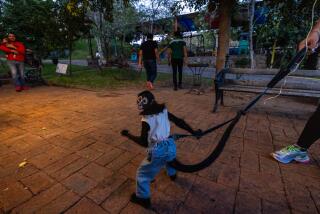Baby Orangutans, Rare Tigers Just Part of Inventory
- Share via
JAKARTA, Indonesia — Peering out from a filthy cage filled with animal droppings and rotting food, the siamang gibbon stretches out a long black hairy arm to grab a banana offered by one of the four men who keep it imprisoned while they search for a buyer.
These animal traders are part of an illegal multimillion-dollar business in Indonesia, which has more endangered primates, including the siamang gibbon, than any other country. Animal rights activists say Jakarta’s Pramuka Market--a five-minute walk from where the siamang gibbon is held in a ramshackle house stacked with cages--is Asia’s largest black market for rare animals.
“You want baby orangutans?” said a market vendor who identified himself only as Iwan. “How about a siamang gibbon? Better be quick, I’ve sold five already today.
“If there is anything you want, we can get it for you,” Iwan added.
The total value of Indonesia’s illegal animal trade is unknown, but animal activists say hundreds of creatures are sold each month despite their protection under the Convention on International Trade in Endangered Species of Wild Flora and Fauna.
Demand for rare animals is great; they are sold as pets or valuable collectors’ items and for use as food or medicine. Typical is the siamang, the largest of the gibbon apes, with long arms for swinging in trees. The cute siamang babies are popular as pets, but owners often abandon the full-grown animals, which can be 3 feet tall and have a piercing cry.
Environmentalists say a shrinking habitat also threatens Indonesia’s rare species. The lush forests are rapidly disappearing due to urban expansion and uncontrolled logging.
Often the wild animals wind up at the Pramuka Market, which covers an area the size of a football field in East Jakarta. Established in 1967 as a bird market, it has sold all manner of creatures since the 1980s. Overlooking it is a remnant of failed campaigns to combat the illegal trade--a faded billboard threatening sellers and buyers of endangered animals with five years’ imprisonment.
Market officials insist that there are no illegal sales of animals, but shady transactions regularly take place in the market’s back alleys.
“The illegal trade of endangered animals is rampant here,” said Will Smith, an activist with the Liechtenstein-based Gibbon Foundation, which focuses on Indonesia.
Department stores display jewelry and knickknacks fashioned from giant turtles and elephants’ tusks, and hawkers approach drivers at busy downtown intersections, offering terrified animals like the cuscus, a small marsupial, for as little as $25.
Newspapers and online media sites publish classified ads under “collector’s items,” offering rare animals or just parts of them.
A stuffed Sumatran tiger carries one of the largest price tags, about $2,500. Even pieces of this magnificent creature are for sale--tiger’s penises are sold as aphrodisiacs, and ground-up bones, claws and teeth go into traditional Chinese remedies for arthritis and rheumatism.
The World Wide Fund for Nature Indonesia is planning a major campaign starting this month to raise awareness of endangered animals, focusing on the plight of the tigers along with orangutans and rhinoceroses.
The fund says an average of 33 Sumatran tigers are killed every year and the species could become extinct by 2010. The Javan rhino, once abundant in Southeast Asia, is on the critically endangered list. Hunters slaughter it merely for its horn, a valued ingredient in Oriental medicine.
Fewer than 20,000 orangutans are left in Indonesia because hundreds of the orange-haired apes are smuggled each year to the United States and other industrialized countries, where they fetch up to $30,000. Baby orangutans are the most popular--and the most vulnerable. Smugglers usually ship five babies together, sedated in a cardboard box, to ensure that at least one survives the long, arduous journey by boat.
Chairul Saleh, a senior campaigner for the nature fund, said the new campaign of information about rare species must go beyond the usual cooperation with authorities to catch smugglers.
“We want to cut off the trade from the consumer side,” he said. “We want to make endangered animals deeply unfashionable.”
More to Read
Sign up for Essential California
The most important California stories and recommendations in your inbox every morning.
You may occasionally receive promotional content from the Los Angeles Times.













